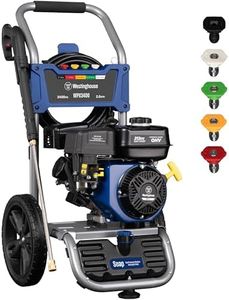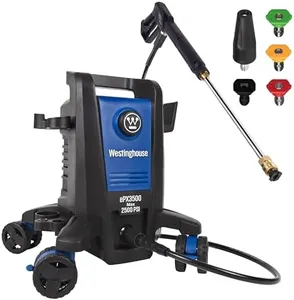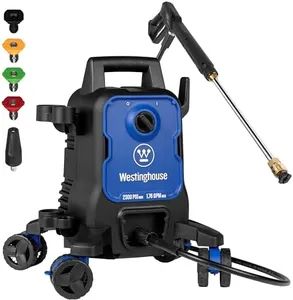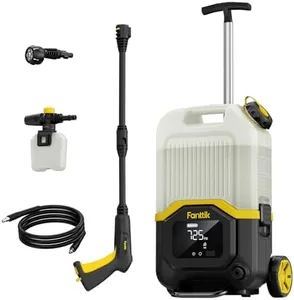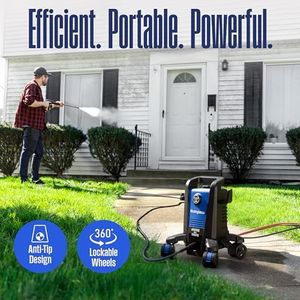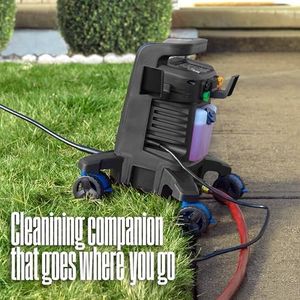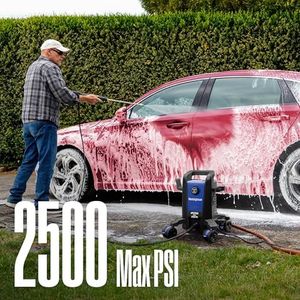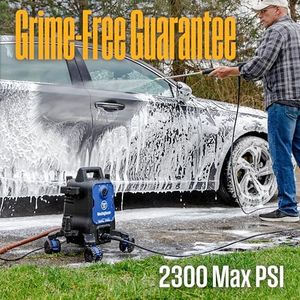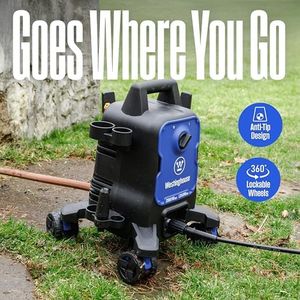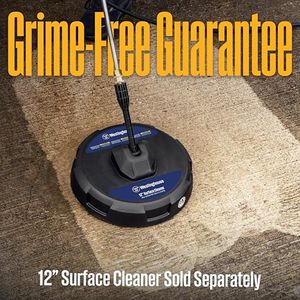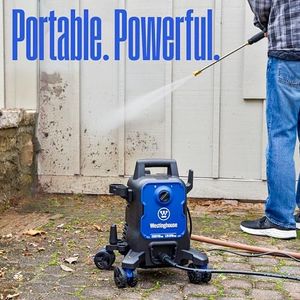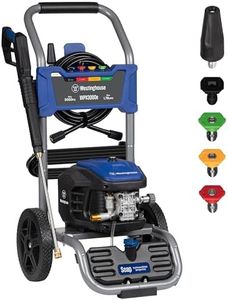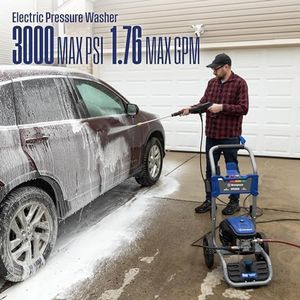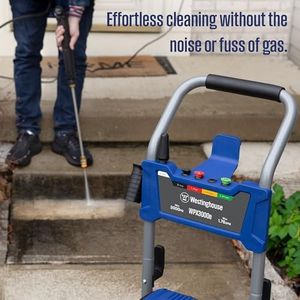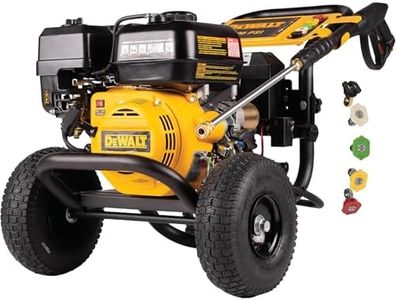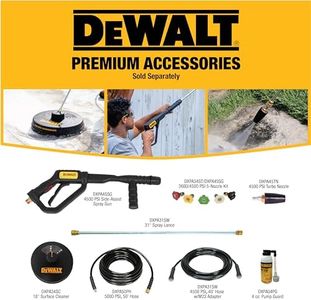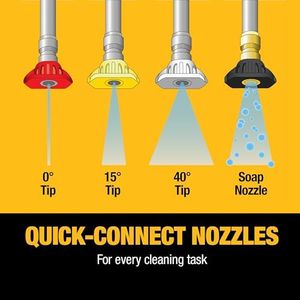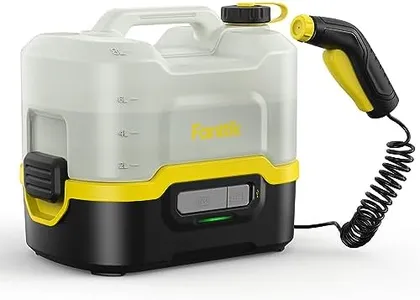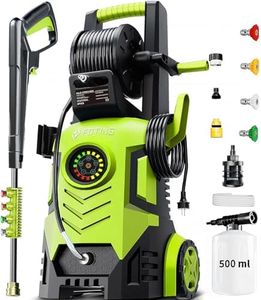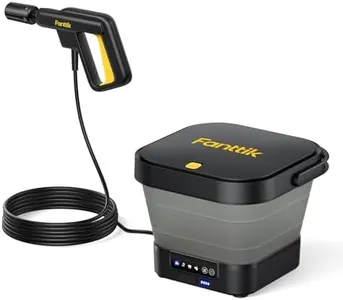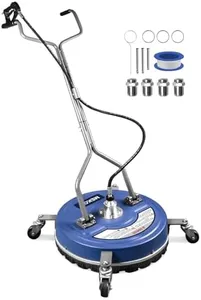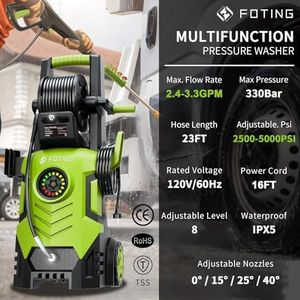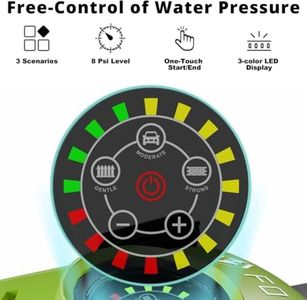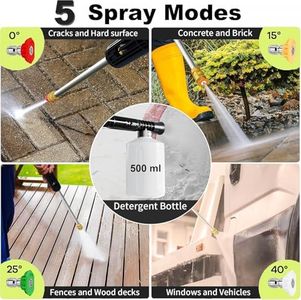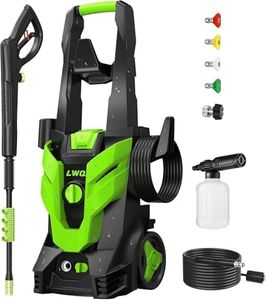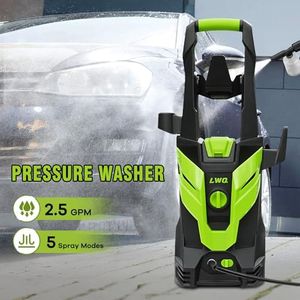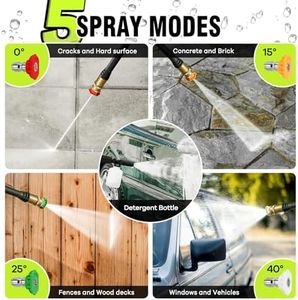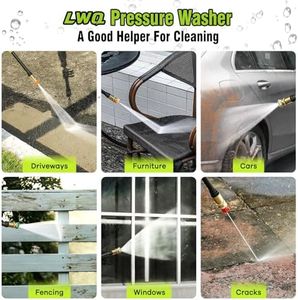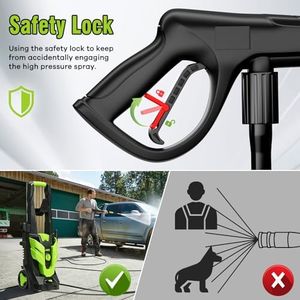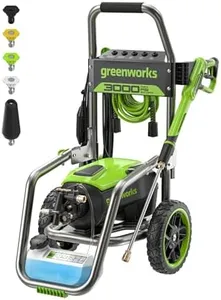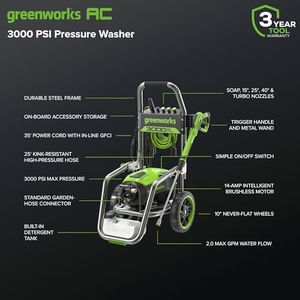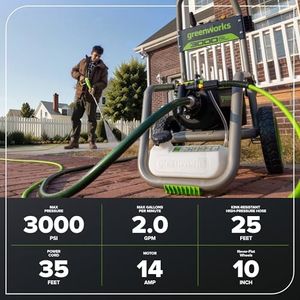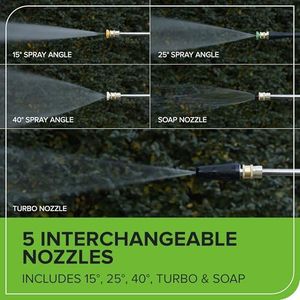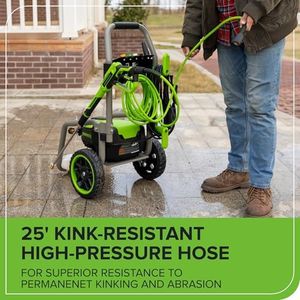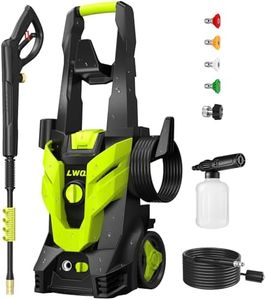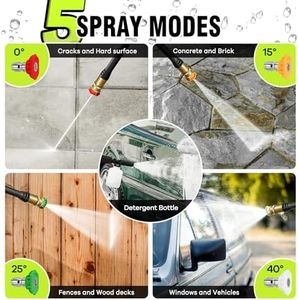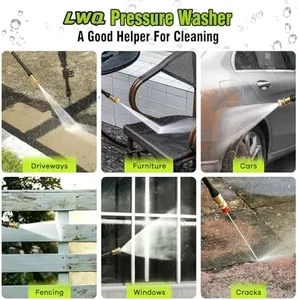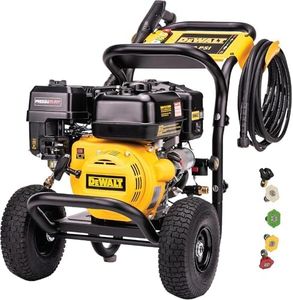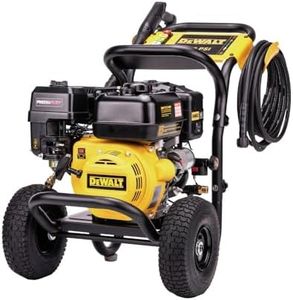10 Best Power Washers 2026 in the United States
Winner
Westinghouse WPX3400 Gas Pressure Washer, 3400 PSI and 2.6 Max GPM, Onboard Soap Tank, Spray Gun and Wand, 5 Nozzle Set, for Cars/Fences/Driveways/Homes/Patios/Furniture
The Westinghouse WPX3400 Gas Pressure Washer is a robust machine designed for effective cleaning of various surfaces like decks, fences, and vehicles. Its standout feature is its powerful 3400 PSI and a flow rate of 2.6 GPM, making it suitable for heavy-duty tasks and deep cleaning. The 25-foot hose allows for a good reach, and the adjustable nozzles (five in total) provide versatility for different cleaning needs—from delicate surfaces to tougher stains.
Most important from
24121 reviews
Westinghouse ePX3500 Electric Pressure Washer, 2500 Max PSI 1.76 Max GPM with Anti-Tipping Technology, Onboard Soap Tank, Pro-Style Steel Wand, 5-Nozzle Set, for Cars/Fences/Driveways/Home/Patios
The Westinghouse ePX3500 Electric Pressure Washer is a solid choice for homeowners looking to tackle various cleaning tasks like cars, patios, and driveways. With a maximum pressure of 2500 PSI and a flow rate of 1.76 GPM, it offers ample cleaning power to remove dirt and grime effectively. The five quick-connect nozzles, including a turbo option, provide versatility for different surfaces and cleaning needs.
Most important from
18817 reviews
Westinghouse ePX3100 Electric Pressure Washer, 2300 Max PSI 1.76 Max GPM with Anti-Tipping Technology, Onboard Soap Tank, Pro-Style Steel Wand, 5-Nozzle Set, for Cars/Fences/Driveways/Home/Patios
The Westinghouse ePX3100 is a solid choice for anyone needing a power washer for various cleaning tasks like cars, fences, driveways, homes, and patios. The unit delivers a maximum of 2300 PSI, providing strong water pressure for deep cleaning. Its water flow rate of up to 1.76 GPM is decent, although it can vary depending on the nozzle used. The washer comes with a variety of nozzle options (0-degree, 15-degree, 25-degree, turbo, and soap applicator), making it versatile for different cleaning needs.
Most important from
18817 reviews
Top 10 Best Power Washers 2026 in the United States
Winner
Westinghouse WPX3400 Gas Pressure Washer, 3400 PSI and 2.6 Max GPM, Onboard Soap Tank, Spray Gun and Wand, 5 Nozzle Set, for Cars/Fences/Driveways/Homes/Patios/Furniture
Westinghouse WPX3400 Gas Pressure Washer, 3400 PSI and 2.6 Max GPM, Onboard Soap Tank, Spray Gun and Wand, 5 Nozzle Set, for Cars/Fences/Driveways/Homes/Patios/Furniture
Chosen by 1455 this week
Westinghouse ePX3500 Electric Pressure Washer, 2500 Max PSI 1.76 Max GPM with Anti-Tipping Technology, Onboard Soap Tank, Pro-Style Steel Wand, 5-Nozzle Set, for Cars/Fences/Driveways/Home/Patios
Westinghouse ePX3500 Electric Pressure Washer, 2500 Max PSI 1.76 Max GPM with Anti-Tipping Technology, Onboard Soap Tank, Pro-Style Steel Wand, 5-Nozzle Set, for Cars/Fences/Driveways/Home/Patios
Westinghouse ePX3100 Electric Pressure Washer, 2300 Max PSI 1.76 Max GPM with Anti-Tipping Technology, Onboard Soap Tank, Pro-Style Steel Wand, 5-Nozzle Set, for Cars/Fences/Driveways/Home/Patios
Westinghouse ePX3100 Electric Pressure Washer, 2300 Max PSI 1.76 Max GPM with Anti-Tipping Technology, Onboard Soap Tank, Pro-Style Steel Wand, 5-Nozzle Set, for Cars/Fences/Driveways/Home/Patios
Westinghouse WPX3000e Electric Pressure Washer, 3000 Max PSI and 1.76 Max GPM, Induction Motor, Onboard Soap Tank, Spray Gun and Wand, 5 Nozzle Set, for Cars/Fences/Driveways/Homes/Patios/Furniture
Westinghouse WPX3000e Electric Pressure Washer, 3000 Max PSI and 1.76 Max GPM, Induction Motor, Onboard Soap Tank, Spray Gun and Wand, 5 Nozzle Set, for Cars/Fences/Driveways/Homes/Patios/Furniture
DeWalt DXPW3425E-S 3400 PSI Gas Pressure Washer, 2.5 GPM Axial Cam Pump, 208cc Recoil with Electric Start Engine, Spray Gun and Wand, 5 QC Nozzles, 5/16-in. x 25-ft. Hose, 49-State
DeWalt DXPW3425E-S 3400 PSI Gas Pressure Washer, 2.5 GPM Axial Cam Pump, 208cc Recoil with Electric Start Engine, Spray Gun and Wand, 5 QC Nozzles, 5/16-in. x 25-ft. Hose, 49-State
2026Upgraded Pressure Washer 5000PSI with Adjustable Touch Screen 8 Level, 34" Tall, 4 Quick Connect Nozzles,Inlet Hose&Filter&500mlFoam Cannon for Cars/Fences/Driveways/Home Cleaning,Yellow
2026Upgraded Pressure Washer 5000PSI with Adjustable Touch Screen 8 Level, 34" Tall, 4 Quick Connect Nozzles,Inlet Hose&Filter&500mlFoam Cannon for Cars/Fences/Driveways/Home Cleaning,Yellow
Pressure Washer, Washer with 4 Quick Connect Nozzles, Pressure Cleaning Machine with Foam Cannon for Cars/Fences/Driveways/Patios/Home Cleaning
Pressure Washer, Washer with 4 Quick Connect Nozzles, Pressure Cleaning Machine with Foam Cannon for Cars/Fences/Driveways/Patios/Home Cleaning
Greenworks Pro Brushless 3000 PSI (CSA Certified) 2.0 GPM Max / 1.1 GPM Electric Pressure Washer (Foldable Handles, Rugged Steel Frame, 25 FT Hose, 35 FT GFCI Power Cord)
Greenworks Pro Brushless 3000 PSI (CSA Certified) 2.0 GPM Max / 1.1 GPM Electric Pressure Washer (Foldable Handles, Rugged Steel Frame, 25 FT Hose, 35 FT GFCI Power Cord)
LWQ Pressure Washer, Portable Power Washer, 4 Quick Connect Nozzles, High Pressure Cleaning Machine for Car Fence Driveway Patio Washing and More
LWQ Pressure Washer, Portable Power Washer, 4 Quick Connect Nozzles, High Pressure Cleaning Machine for Car Fence Driveway Patio Washing and More
DeWalt DXPW3400PRNB-S PressuReady 3400 PSI Gas Pressure Washer with Quick Start Technology, 2.5 GPM Axial Cam Pump, 208cc Engine, Cold Water, Includes 25-Ft Hose, Nozzles, Spray Gun & Wand, 49-State
DeWalt DXPW3400PRNB-S PressuReady 3400 PSI Gas Pressure Washer with Quick Start Technology, 2.5 GPM Axial Cam Pump, 208cc Engine, Cold Water, Includes 25-Ft Hose, Nozzles, Spray Gun & Wand, 49-State
Our technology thoroughly searches through the online shopping world, reviewing hundreds of sites. We then process and analyze this information, updating in real-time to bring you the latest top-rated products. This way, you always get the best and most current options available.

